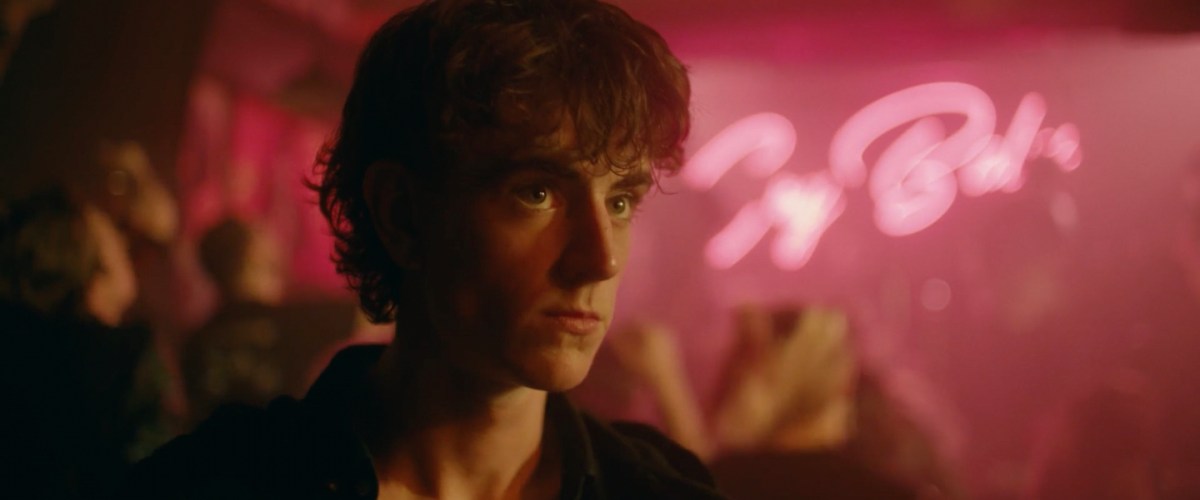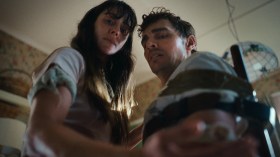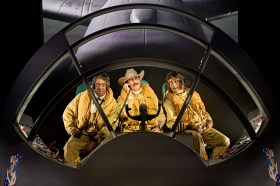Struggling in the aftermath of his father’s death, self-described ’emo’ skateboarder Brock (Jude Turner) enters university determined to escape the northern suburbs of Adelaide. Armed with a natural grasp of economics and the reductive advice of his privileged classmate Hunter (Brad McCarthy), Brock sets out to grow his net worth and set himself on the fast path to success. But when his brazen behaviour incurs the wrath of a local drug gang, both his life, and those closest to him, will be threatened.
Filmed over two years, and mostly self-funded by writer-director Pete Williams, Emotion Is Dead premiered at last year’s Adelaide Film Festival.
While the film’s on-screen claim of being ‘based on true events’ is evidently meant to be taken with a grain of salt, its sensational narrative is cleverly grounded by a couple of real-world occurrences. The first is an incident in which a police patrol car crashed into the front bedroom of a house in Elizabeth South, not far from where Williams grew up which is now considered among the most disadvantaged areas in the country.
Read: David Tiley honoured as ‘Mercury Legend’ at SA Screen Awards
Our introduction to Brock comes as he’s lying in a hospital bed, watching a Channel 9 news report of the story. ‘Sometimes the walls run into you’, he remarks, enigmatically. It’s a phrase that will take on greater meaning when repeated in flashback by Kylie (Tatiana Goode), Brock’s devoted ex-girlfriend – who, alongside his motorsports-superfan mother, Shazza (Gabby Llewelyn), attempts to challenge the teen’s misguided belief that hardships stem primarily from personal failings.
Emotion is Dead and the Holden Elizabeth auto plant
The second, and most significant, event that the film takes inspiration from is the 2017 closure of the Holden Elizabeth plant, which caused the loss of hundreds of jobs and signalled the end of car manufacturing in Australia. The impact of the factory’s demise looms large over the film, from its striking opening title sequence, which eerily distorts the 1970s advertising jingle, ‘football, meat pies, kangaroos and Holden cars’, to the end credits cover of Jimmy Barnes’ ‘Shutting Down Our Town’ by Adelaide emo/pop-punk band Superdose Gangway.
For Brock, the Elizabeth plant is intrinsically tied to memories of his father. In a particularly effective early sequence, he skateboards through the deserted facility. As the camera glides alongside him there’s a sense of his ease: a lightness which suggests the resentment and sadness he feels might eventually give way to love.
Williams takes the opportunity to showcase old photographs of factory workers. It’s a poignant tribute to the decades poured into a now deadened place. Emotion Is Dead is really at its best at moments such as this, when youthful spirit is coupled with a more worldly regard for community.
On the other hand, the film, perhaps inadvertently, taps into one of the foremost horrors of living in the internet age: watching the empathy of young men be voided through the influence of far-right ideologies. While Brock is seemingly meant to be read as a ‘genius’, who is also ’emotional [and] introspective’, I found his most pronounced trait to be a callousness which Emotion Is Dead never really manages to reckon with.
From the beginning of the film, Brock, having come to view the world as ‘one big game of Monopoly’, demonstrates a cruel outlook towards those he perceives to be the losers. The most jarring example comes when he notices a man with two leg amputations. ‘God, it’s like the walking dead out here’, he exclaims in disgust. ‘It’s like, everyone’s just a little bit broken’. This prompts Kylie’s simplistic explanation of how to feel compassion for others, an interaction which will ultimately prove pertinent to the film’s badly misguided final scenes. Disappointingly, Brock’s ableism in equating disability with brokenness is never actually challenged.
Though surely well-intentioned, this and other attempts at social commentary largely come across as half-baked. Similarly, Brock’s money-making scheme, which involves breaking into the houses of his wealthy yard-work clients and hacking into their internet banking accounts to transfer tens of thousands of dollars to himself, is too silly to really be scrutinised.
More interesting is Gardn, the vaguely demonic Airtasker-like app Brock uses to secure these appointments. Gardn holds a certain ominous power over him: each of its disruptive notifications pull him further away from the present moment, and from those who might help him process his feelings in a healthier way.
From the perspective of Hunter’s crime-boss father, Wayne (Adam Tuominen), from whom Brock makes the critical mistake of stealing a hefty sum, the app is apparently some amorphous, impenetrable entity. ‘There’s no phone number; there’s no people – it’s … [an] algorithm!’ He yells at his cool-guy underling, Punk Kid (Jaya Suartika), who is responsible for one of the film’s several lively musical moments.
Featuring turn-of-the-millennium punk/rock songs from bands like Alkaline Trio, Taking Back Sunday, Dashboard Confessional and The Juliana Theory (whose 2000 album inspired the film’s title), Emotion Is Dead often feels like an exercise in reconstructing the core experiences of Williams’ youth. As a love letter to emo, to skateboarding and especially to the northern suburbs of Adelaide, it is very endearing.
Emotion Is Dead is having screenings Australia-wide beginning in late June. See here for a list of upcoming event screenings.
Actors:
Jude Turner, Tatiana Goode, Gabby Llewelyn, Adam Tuominen, Brad McCarthy, Jaya Suartika , Isi Sweeney
Director:
Pete Williams
Format: Movie
Country: Australia
Release: 28 June 2024





